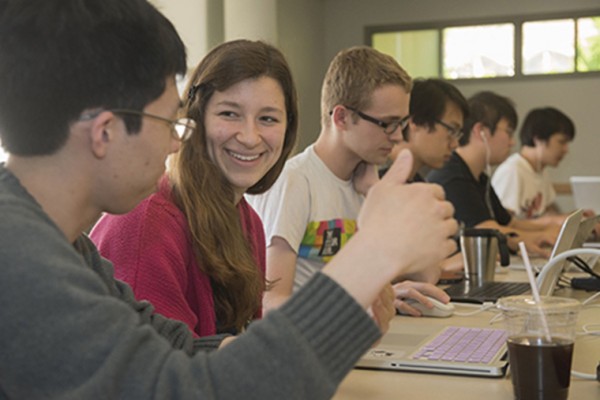WashU seismologist who loves disaster movies reviews ‘San Andreas’
A Washington University earthquake seismologist who is teaching a course on natural disasters in movies reviews the newly released film “San Andreas.” The short version: they clearly didn’t have a seismologist consulting on this film. The take home message: Go see it anyway. It’s summer.
Their classroom is the desert
The hallmark of the 18-month Pathfinder Program in Environmental Sustainability at Washington University in St. Louis is the field trips to ecosystems, such as the Mojave Desert, that give students the chance to see and touch the land they have been studying. It’s hard to get the students back in the van, says Ray Arvidson, who leads the program.
Spirit of St. Louis on Mars
The Opportunity rover is currently exploring a Martian crater named the Spirit of St. Louis, after the famous aircraft — which was in turn named in honor of St. Louis citizens who purchased it for Charles Lindbergh. The mission team picked this naming scheme because Washington University team members spotted a promising target just beyond the crater. As long as the rover remains in the crater, the names will drawn from a list of names related to the famous flight.
Why do some rocks glow?
There’s a small room in Rudolph Hall, at Washington University in St. Louis, that most students walk right past without noticing. But when anyone finds it, they usually insist all their friends come and look as well. It’s one of those special things about the university no student ever forgets, and this is the story […]
Massively parallel biology students
The list of authors for an article on the comparative genomics of a fruit fly chromosome, published online May 11 by the journal G3, includes 940 undergraduates from 63 institutions. It is the result of an effort, coordinated through Washington University in St. Louis, to provide many more students with a hands-on research experience than has traditionally been possible.
Rocks that glow in the dark
There’s a small room in Rudolph Hall that most students walk right past
without noticing. But when anyone finds it, they usually insist all
their friends come and look as well. It’s one of those special things about the university no student ever forgets, and this is the story of how it came to be there.
Coming soon: First encounter with a new class of worlds
After an epic journey across the breadth of the solar system, the New
Horizons spacecraft is finally nearing its destination: the Pluto system, a staggering three billion miles from Earth. William McKinnon, a planetary scientist at Washington University in St. Louis, explains that our understanding of Pluto has been transformed in the nearly 10 years the probe has been en route to its target.
I-CARES announces 2015 funded research projects
The International Center for Advanced Renewable Energy and Sustainability (I-CARES) has announced the winners from its 2015 call for proposals. This year, the center awarded funds to 10 projects involving nearly 30 Washington University faculty from four schools.
Carrot or stick? Punishments may guide behavior more effectively than rewards
When it comes to rewards and punishments, which is more effective — the carrot or the stick? Researchers at Washington University in St. Louis have devised a simple experiment to test the effects of rewards and punishments on behavior and have found that punishments seem to be more effective at influencing behavior.
As the river rises: Cahokia’s emergence and decline linked to Mississippi River flooding
Sediment cores from two lakes in the Mississippi floodplain show that Cahokia, the largest prehistoric settlement in the Americas north of Mexico, emerged during a period when there were few severe floods on the river and that its decline and abandonment coincided with the return of large floods.
Older Stories






